| The Waterloo Public Library will be open today until 5:00 p.m. We'll be closed New Year's Day, but will reopen Tuesday morning at 9:00 a.m. Until then, Happy New Year! | |
Sunday, December 31, 2006
Happy New Year!
Thursday, December 28, 2006
Welcome Back!

We've now reached the end of our second day back from the Christmas holiday and the Reference Department is very busy. Our hundreds of regular patrons have been joined by their out-of-town friends and relatives to make extra time on the PACs, hard to come by.
Tuesday morning, Kim V and I replaced the old firewall with new hardware and software. After two days of extremely heavy usage, the update is a booming success. While functional, the old system had some limitations, wasn't easy to configure, and didn't have advanced monitoring tools. Those deficits have been remedied and it's now time to move on to other improvements.
The PACs use a product from Team Software Solutions, Public Web Browser 2, as a "front-end" for Microsoft's Internet Explorer. Several weeks ago Microsoft released their first browser upgrade in half a decade: Internet Explorer 7.0. We've been running it on one of the PACs (you'll have to guess which one) for about a week with good results. So, sometime this weekend we'll be looking at upgrading the other 32 (don't forget the four in Youth) WPL PACs.
We'll also be checking the configuration of each of the Reference Department PACs. I noticed this afternoon that at least one machine (PAC #5), "forgot" its session information after a restart. The result? Instead of getting a 2 minute grace period during which the user could resume the session, our patron had to get back in the queue. It turns out that several others have also suffered from this phenomenon.
The good news? We're confident that we've identified the problem. The bad news is that to remedy it we'll have to visit every machine while we're closed. Right now, we're thinking of doing it some evening this weekend. If not, we'll start early Tuesday and hope for the best.
On a more cheerful note, have you noticed that the printing is going faster? We're using a new print driver, have added system memory, and updated the firmware. Testing shows that complex color jobs now complete in less than half the time needed by the old configuration. Many thanks to Matt, the new ASI technician who made the suggestions.
c 2006 Waterloo Public Library
Friday, December 22, 2006
Happy Holidays!
Wednesday, December 20, 2006
Cunningham Students Serenade the WPL!
 Students from the Dr. Walter Cunningham School for Excellence entertained WPL staff and patrons with Christmas carols this morning. For pictures, visit our our new Flickr site.
Students from the Dr. Walter Cunningham School for Excellence entertained WPL staff and patrons with Christmas carols this morning. For pictures, visit our our new Flickr site.c 2006 Waterloo Public Library
Tuesday, December 19, 2006
Our New (to us, anyway) Microfilm Reader

One of our ancient mechanical microfilm readers passed away this week. Age finally caught up with it as the cost of repairs became prohibitive.
Luckily for the Waterloo Public Library, microfilm reader vendor Dave Thomas came to the rescue. For about a third of the cost of resurrecting our old hand-crank model, Dave sold us an electric version.
The Library Researcher Gideon 1000 is used, but has been refurbished. Even before Dave had a chance to fork over the invoice, one of our regular microfilm patrons was cooing over the improvement.
The next time you need to look up an obituary, or just want to know the price of milk in 1966, give the new microfilm reader a try.
c 2006 Waterloo Public Library
Sunday, December 17, 2006
Why pay $4 - $8 bucks?
I was out at Barnes & Noble the other day, browsing through their magazine titles to see what was new, when I happened to glance at some of the newstand prices.
$3.95 for Rolling Stone...
$4.50 for the New Yorker (my husband's favorite)...
$4.95 for Martha Stewart Living...
$6.95 for Everton's Genealogical Helper...
$7.99 for Fine Homebuilding or Starlog!
I'd go broke if I tried to buy all these titles, even with subscription discounts!
But ---
Did you know that WPL subscribes to almost 200 different magazine titles, including the ones listed above?
What an easy way to stay up-to-date and save money!
Adult magazines are located on racks at the top of the stairs on WPL's second floor.
We also have a Teen magazine area on 2nd Floor with great titles like Vibe, Slam and Spin.
Our Youth Department also has a magazine section, with titles like American Girl, Highlights for Children, and Dirt Bike, among others.
Si prefiere leer en español, tenemos periódicos como Furia Musical, Latina y Quien.
To check for a given title, visit our catalog.
c 2006 Waterloo Public Library
$3.95 for Rolling Stone...
$4.50 for the New Yorker (my husband's favorite)...
$4.95 for Martha Stewart Living...
$6.95 for Everton's Genealogical Helper...
$7.99 for Fine Homebuilding or Starlog!
I'd go broke if I tried to buy all these titles, even with subscription discounts!
But ---
Did you know that WPL subscribes to almost 200 different magazine titles, including the ones listed above?
What an easy way to stay up-to-date and save money!
Adult magazines are located on racks at the top of the stairs on WPL's second floor.
We also have a Teen magazine area on 2nd Floor with great titles like Vibe, Slam and Spin.
Our Youth Department also has a magazine section, with titles like American Girl, Highlights for Children, and Dirt Bike, among others.
Si prefiere leer en español, tenemos periódicos como Furia Musical, Latina y Quien.
To check for a given title, visit our catalog.
c 2006 Waterloo Public Library
Saturday, December 16, 2006
Adult PACs in Youth
 Caregivers for our younger patrons are expected remain in the vicinity of their charges. Since the adult PACs are upstairs, this meant that mom, dad, or big sister couldn't go surfing without risking the ire of Youth Librarians brandishing copies of the Safe Child Policy.
Caregivers for our younger patrons are expected remain in the vicinity of their charges. Since the adult PACs are upstairs, this meant that mom, dad, or big sister couldn't go surfing without risking the ire of Youth Librarians brandishing copies of the Safe Child Policy.With the installation of two high speed PACs across from the Youth Department service desk, parents may now spend up to an hour a day (30 minutes if we're busy) checking their email, shopping, or doing whatever else it is that people do on the Internet.
In addition to Internet access, these computers are equipped with the MS Office XP suite as well as FrontPage. If you have a camera with a USB cable, plug it into one of the ports and download your images for manipulation with MS Photo Editor. When you're done, email them to yourself or save to a thumb drive as all traces of your session are erased when the computer restarts.
If you wish to print, you'll have to tote your documents to the second floor where you may log into the full-service PACs which include access to a printer capable of high resolution color or highspeed duplexing.
c 2006 Waterloo Public Library
Thursday, December 14, 2006
WPL Speed Demons
 The Waterloo Public Library switched to a new Internet Service Provider in mid-September. Where we used to share a 3 mb/s connection with 6 other libraries, we're now the prime user of a 10 mb/s line. As I examined the firewall incoming log this evening, it occurs to me that we're regularly seeing through-puts of over 600 kb/s.
The Waterloo Public Library switched to a new Internet Service Provider in mid-September. Where we used to share a 3 mb/s connection with 6 other libraries, we're now the prime user of a 10 mb/s line. As I examined the firewall incoming log this evening, it occurs to me that we're regularly seeing through-puts of over 600 kb/s.Prior to the change-over, the library rarely moved as much as 200 kb/s and was often lucky to see 100 kb/s. While downloading a service pack the other day, I saw a burst speed of well over 1,000 kb/s! As a practical matter, we've now got as much bandwidth as we can use: we're no longer the bottleneck.
There are times when we have as many as 33 Pentium 4 computers simultaneously surfing the net, streaming video, and circulating books, with little or no latency. The combination of modern computers, current software, and an extremely high speed Internet pipe has made the WPL PACs a very popular service.
This connection might be as good as it gets--for now, anyway!
---
c 2006 Waterloo Public Library
Wednesday, December 13, 2006
Insert Your $ First!
 While helping patrons recover print jobs Sunday afternoon I noticed an interesting phenomenon: Every single user scanned his or her card, selected the job(s), and THEN inserted the money. This usually works out okay, but quite often, it doesn't.
While helping patrons recover print jobs Sunday afternoon I noticed an interesting phenomenon: Every single user scanned his or her card, selected the job(s), and THEN inserted the money. This usually works out okay, but quite often, it doesn't.The system is set to time-out 30 seconds after the card is scanned. This means that if you scan your card, pick your jobs, and spend a minute fumbling around for change, you might have to start over from the beginning.
My advice? When you send your print job, a few moments after you've named it, the cost computation will pop up in the lower right hand corner of the screen; remember the amount. When you approach the print release station, drop your money in the coin box first. Then, scan your card, select your job(s), and click the "print" button.
Follow these steps, your prints will be released, you'll be able to get back to work, and others won't have to stand in line while you fumble around for your card and change.
Sunday, December 10, 2006
Introduction to E-Learning
 Every time I work the WPL Reference Desk I run into desperate students: Students from Hawkeye Community College, Upper Iowa University, Hamilton College, the University of Northern Iowa, and even DMACC!
Every time I work the WPL Reference Desk I run into desperate students: Students from Hawkeye Community College, Upper Iowa University, Hamilton College, the University of Northern Iowa, and even DMACC!Life-long learning is one of the core values of the Waterloo Public Library and Reference staff are particularly interested in supporting patrons using library resources to do homework or to take tests.
Many of our student patrons struggle with educational technology; they spend as much time figuring out how to run programs and manage files as they do learning history or economics. Staff members want to help--and often do so--but there's a limit to how much can be done in the limited amount of time available.
Luckily, there's now an option for students who want to improve their computer skills: Introduction to E-Learning, a 2 hour developmental elective that gives students who are new to technology the skills necessary to succeed in college.
How did I hear about this great learning opportunity? My wife, Professor Cherie Post-Dargan, is the course designer and teacher.
Saturday, December 09, 2006
We're there!
 With the application of the latest service pack from Pharos, the upgrade of the reservation and printing system is complete. You'll notice a couple of changes. On the left is a sample of the new cost computation popup that will appear a few seconds after you've named your print job.
With the application of the latest service pack from Pharos, the upgrade of the reservation and printing system is complete. You'll notice a couple of changes. On the left is a sample of the new cost computation popup that will appear a few seconds after you've named your print job. The other big changes are also print related. The upgrade allows us get consistent page counts. This means that, instead of having to charge by the sheet, we can now charge by the page. That's good, because we're finally charging the correct amount: 5 cents per page, whether simplex or duplex.
In response to popular demand, the public access computers now default to simplex. If you want duplexing, click the printer "preferences" button, then click the "Print on both Sides" box. Let me know if you have any questions about print charging or switching between simplex and duplex printing.
We've also made a couple of repairs to the printer which have greatly improved quality. Sometime later this week we're going to experiment with adding more memory; maybe that--along with the improved Kyocera drivers--will speed things up a bit.
Thursday, December 07, 2006
Close, but not quite there yet

Monday's upgrade to Pharos 7.2 did not go very well, and I was a bit apprehensive about applying the same product to the Cedar Falls Public Library early this morning. However, the vendor, Freddy Rodriguez of Dallas, Texas, informed me that Pharos has released two hot fixes (one made things worse!) since Monday.
The Cedar Falls PL upgrade used the latest hot fix and the system now runs much better. So, I had Freddy make a distribution package that I'll apply in Waterloo Saturday evening. At that time we'll set the PACs so that they default to simplex (single-sided) printing and will also apply the hot fix. I'm optimistic that this will make our lives much easier.
Thursday, November 30, 2006
Bye-Bye, Floppy! Hello, Flash!
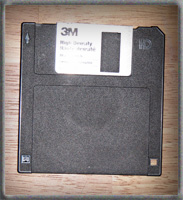 Heads up!
Heads up!On February 1st, 2007, WPL will discontinue the support of floppy drives in its computers.
The first floppy drives were introduced in the early 1970s, and at that time they used 8-inch disks. By 1976, this was reduced in size to a 5.25-in diskette which some of you might remember.
In 1980, Sony introduced the 3.5-inch floppy, which today can hold about 1.4 megabytes of data.
(For a more complete history of the floppy, click here.)
While floppies have been great for holding text documents, which have small file sizes, they are simply becoming outdated as computer program file sizes get larger and people routinely transfer music, pictures, and video files online.
So, beginning February 1st, the floppy drives in our computers will be disabled.

For our many patrons who currently store their documents on floppy disks, you will either need to find a way to store your documents on the web, or you will need to acquire a flash drive.
Flash drives (seen in the photo to the right) are also known as thumb drives or jump drives. They come in many different shapes and colors. The size of the drive, meaning the amount of information it can hold, affects its price.
For those of you who need to replace your floppies and don't want to put a lot of money into it, Target has a 32-megabyte Memorex brand flash drive for about $5. Other area retailers probably offer similar deals.
A 32-megabyte drive won't hold a lot of pictures, so if you can afford it, we recommend that you look for a larger drive. These drives plug into USB ports located on the front of all WPL computers.
While our floppy drives are still working, we recommend that you acquire a flash drive and plan on transferring your files off of your old floppies before Feb. 1.
If you don't want to purchase a flash drive, there are also ways that you can store your documents online. Many people choose to create a document on the WPL computers, and then save the file and e-mail it to themselves as an attachment.
Another service that you might want to try is Google's Documents and Spreadsheets service, which allows you to create and store text documents on the web so that you can access them from any computer with Internet access.
Wednesday, November 29, 2006
Printer Woes
 The Reference Department public printer has been intermittently blowing toner on the left margin of print jobs. The vendor has been notified and should be in to fix it yet this morning. In the meantime, if you get a result like the page above, contact a staff member for help.
The Reference Department public printer has been intermittently blowing toner on the left margin of print jobs. The vendor has been notified and should be in to fix it yet this morning. In the meantime, if you get a result like the page above, contact a staff member for help.Also, keep in mind that the Public Access Computers will be unavailable most, if not all, of Monday the 4th.
Monday, November 27, 2006
Computer Outage December 4, 2006

The Waterloo Public Library PACs (public access computers) will be unavailable most, if not all, of the day Monday, December 4, 2006. Starting at 9:30 a.m., the vendor and I will upgrade the server, reservation, and print-release stations from Pharos Vx3 7.0 to 7.2. I will then upgrade each client machine.
Since we're making such major changes, we're also going to upgrade the printing. I've never been pleased with the speed of the new printer and have been working with Kyocera engineers for a solution. It looks like they have a new driver that will speed things up a bit.
So, the PACs won't be available Monday morning and will be down until all upgrades are in place. I can't say precisely when they'll be back, but I expect the computers to be out-of-service at least until late afternoon or early evening. It's possible that they will be unavailable until some time on Tuesday.
If you really need to be on a PC Monday, I suggest that you visit the Cedar Falls Public Library at 524 Main Street, Cedar Falls, IA.
Sunday, November 26, 2006
Learning Center PACs Tweaked
 Saturday's introduction of the Learning Center Public Access Computers (PACs) to our reservation system was a bit confusing. I overlooked the fact that the available stations would be assigned by the computer's "network name" rather than the "display name." The result was some confusion when the Learning Center PACs were assigned first by the system. We've reconfigured the system and now the computers out on the floor should be assigned before the Learning Center stations.
Saturday's introduction of the Learning Center Public Access Computers (PACs) to our reservation system was a bit confusing. I overlooked the fact that the available stations would be assigned by the computer's "network name" rather than the "display name." The result was some confusion when the Learning Center PACs were assigned first by the system. We've reconfigured the system and now the computers out on the floor should be assigned before the Learning Center stations.The Learning Center gets a bit warm with all those computers running, and adding 6 users doesn't help. For now, we've got a couple of fans to keep the air moving, but we hope to get some improvements from the city's HVAC people. In the meantime, short-sleeved shirts might be in order.
If you're assigned to a Learning Center computer and need some staff help you may have to come to the Reference Island. That's a disadvantage of opening up this fairly remote location, but better than the alternative: Sitting in a chair watching the Queue display for an hour!
Should you run into a problem with your computer, or if you'd like to make a suggestion for improvement or additional features, don't hesitate to use the "comments" button at the end of this article.
Friday, November 24, 2006
Return of the Coinbox
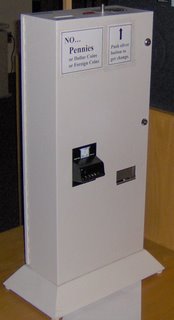
The 23 Waterloo Public Library PACs (Public Access Computers) have a new Internet homepage today: the Waterloo Public Library Reference Department blog. This tool will make it easier for staff to get messages to you, and the "comments" link at the bottom of each page will make it easier for you to speak with us. If you have a yearning for the old home page, there's a link just above this article and another one in the "Links" section just below the "Contributors" block. We'll run the blog for a few months and will then decide whether or not it's worth continuing.
We have lots of news today: the coinbox which controls the print-release station is back from the repair depot in Texas. For the past month or so all public access computers have been on bypass (also known as the "honor system"), and color printing has been disabled. I took advantage of the library's Thanksgiving holiday to plug it in and to reconfigure the server to once again accept money for printing.
The box, a Jamex purchased by the Friends of the Library back in 2002, has controlled the printing of more than a half-million sheets of paper--that's enough to stretch from the library parking lot to downtown Des Moines! It was more than ready for an over-haul; let's hope the technicians got everything put back together correctly.
While I was at it, I also added the six Learning Center computers to the group of PACs controlled by the Pharos reservation system. The added machines should reduce the length of the queue and will also cut back on the congestion near the reservation station.
The Learning Center will still be used for tutoring and training as the reservation system allows us to make "block" reservations. Currently, the Learning Center computers are reserved each Monday and Wednesday afternoon, 2:50-7:00 p.m. The Learning Center may also be reserved at other times by our trainers. This may seem a bit inconvenient, however, it's a small price to pay for gaining another 250-300 hours of PAC access each week!
That's all for now, but we'll try to post messages every couple of days or so. If you wish to communicate with us, use the comments button at the bottom of the page, or send an email to infowiz.wpl@gmail.com.
Monday, November 20, 2006
If Fox had published it?
Fox News announced earlier today that, on second thought, publication of O.J. Simpson's book, If I did it?, wasn't such a hot idea after all. In a rare case of corporate "morality," Fox's owner, Rupert Murdoch, concluded that the initial decision had been "ill-considered." In any case, the book has been cancelled, (for the moment, at least) but the question remains: had the publication proceeded as planned, is this a book that public libraries should be expected to purchase and circulate? My answer? Yes!
Libraries, especially public libraries, are in the business of providing access to information desired by their readers. If our patrons want to read a book, our job is to get it into their hands as quickly, economically, and privately, as possible. This practice is nothing new. Controversial books regularly appear on library shelves and are just as regularly challenged by censors. In fact, the controversy over the Simpson book is reminiscent of the uproar over Andrew MacDonald's novel, The Turner Diaries back in the mid-1990s.
That wierd little book is of negligible literary value, but has nontheless become the bible of American anti-government extremists. In 1995 The Turner Diaries became familiar to a wider audience when excerpts were found in Timothy McVeigh's car when he was arrested after the Oklahoma City Murrah Building bombing. I'm certainly not an "anti-government extremist," but as a student of literature I wondered what there was about this book that made otherwise normal people into heartless murderers.
So, I figured I'd visit the local library to check it out. After all, I knew that public libraries regularly carried copies of Adolf Hitler's Mein Kampf, and likewise figured that they'd have no qualms about carrying MacDonald's work. I was very wrong. My then local library did not have a copy, the librarian was not at all interested in getting it via ILL, and it sunk in on me that maybe I shouldn't pursue the issue. So I backed away and didn't think about the incident for more than a decade.
However, while in library school I learned about the father of modern librarianship, S.R. Ranganathan, and his 5 laws of library service. His second and third laws, "Every person his or her book and Every book its reader," require that every library patron should have access to the materials that they desire, and that every book should be likewise available. Ranganathan felt that libraries should be in the business of information dissemination, not restriction.
Ranganathan would be pleased to see that the holdings of the Waterloo Public Library include The Turner Diaries; he would also expect to see us acquire Simpson's If I did it,when and if it becomes available. If the decision to cancel Simpson's book is rescinded, I predict that most public libraries will make it available and that their patrons will have unrestricted access.
Libraries, especially public libraries, are in the business of providing access to information desired by their readers. If our patrons want to read a book, our job is to get it into their hands as quickly, economically, and privately, as possible. This practice is nothing new. Controversial books regularly appear on library shelves and are just as regularly challenged by censors. In fact, the controversy over the Simpson book is reminiscent of the uproar over Andrew MacDonald's novel, The Turner Diaries back in the mid-1990s.
That wierd little book is of negligible literary value, but has nontheless become the bible of American anti-government extremists. In 1995 The Turner Diaries became familiar to a wider audience when excerpts were found in Timothy McVeigh's car when he was arrested after the Oklahoma City Murrah Building bombing. I'm certainly not an "anti-government extremist," but as a student of literature I wondered what there was about this book that made otherwise normal people into heartless murderers.
So, I figured I'd visit the local library to check it out. After all, I knew that public libraries regularly carried copies of Adolf Hitler's Mein Kampf, and likewise figured that they'd have no qualms about carrying MacDonald's work. I was very wrong. My then local library did not have a copy, the librarian was not at all interested in getting it via ILL, and it sunk in on me that maybe I shouldn't pursue the issue. So I backed away and didn't think about the incident for more than a decade.
However, while in library school I learned about the father of modern librarianship, S.R. Ranganathan, and his 5 laws of library service. His second and third laws, "Every person his or her book and Every book its reader," require that every library patron should have access to the materials that they desire, and that every book should be likewise available. Ranganathan felt that libraries should be in the business of information dissemination, not restriction.
Ranganathan would be pleased to see that the holdings of the Waterloo Public Library include The Turner Diaries; he would also expect to see us acquire Simpson's If I did it,when and if it becomes available. If the decision to cancel Simpson's book is rescinded, I predict that most public libraries will make it available and that their patrons will have unrestricted access.
Sunday, November 19, 2006
Sunday @ the WPL
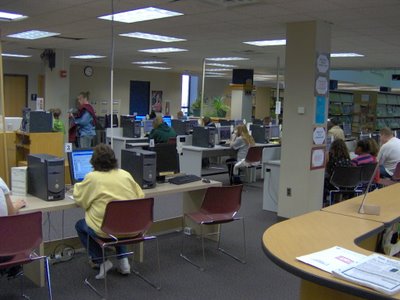 We had another busy day in the Waterloo Public Library Reference Department. Within 10 minutes of opening, 15 computers were in use; we had 100% usage on the public machines by 1:30 p.m. and the queue remained occupied through 4:30. The 6 Learning Center PCs were in use by 2:00 p.m. By the afternoon's end, WPL patrons had completed more than 75 sessions.
We had another busy day in the Waterloo Public Library Reference Department. Within 10 minutes of opening, 15 computers were in use; we had 100% usage on the public machines by 1:30 p.m. and the queue remained occupied through 4:30. The 6 Learning Center PCs were in use by 2:00 p.m. By the afternoon's end, WPL patrons had completed more than 75 sessions. Staff and patrons combined to run an astounding 3.2 GB through the firewall's external interface. It's hard to believe that only a few years ago the library rarely exceeded 500 MB per month. The big increase in performance can be attributed to two big advances: First, instead of sharing a T1 line with other libraries we now have access to dedicated 10MB ethernet connection. Second, we have an excellent collection of Pentium 4 computers with at least a gigabyte of RAM.
Despite the tremedous amount of work accomplished by scores of patrons, a couple of people did have problems. One young lady couldn't access data on her diskette drive. The diskette, which appeared to be a hand-me-down from her grandmother's college days, was not recognized by our drives.
I wasn't able to help her, but I did have some advice: Instead of using a diskette to transfer data, I suggested that she acquire and use a thumb drive. Even the smallest thumb drive has greater data capacity than a 3.5" diskette. The thumb drive is also much more reliable and, if you figure the price per megabyte of storage, far cheaper.
Yet another reason for changing from diskettes to thumb drives is that the WPL will soon (February 1, 2007) disable the diskette drives on all public access computers. So, if you want to bring data to the WPL computers, bring it on a thumb drive, or post it to yourself as an email which you may then download for editing. Frankly, when I know that I'm going to want to access data from a remote site, I save it to Google Docs.
However, that's a topic for another blog.
Saturday, November 18, 2006
Express Lane Checkouts!
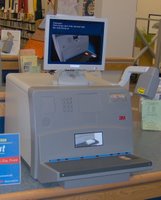
A popular addition to the Waterloo Public Library's list of services is our two 3M 6210 Self-Checks. Since their installation several years ago the machines have absorbed as much as 70% of the library's circulation traffic.
The Self-Checks are easy to use, quick, and private. Their LCD screens provide illustrated step-by-step instructions. If the system is not able to complete a transaction--most commonly because of a fines or an expired card--you'll be directed to the Circulation Service Desk, only a few steps away.
Some patrons have expressed concern that the new machines are impersonal and may have displaced workers. In fact, no jobs were lost due to the Self-Checks' installation, and existing staff have used the extra time to support other services. In any case, if you want your check outs to be handled by a real person, step over the the Service Counter and we'll get you going!
Thursday, November 16, 2006
Learning at the Waterloo Public Library
 Need help with homework? Do you need to refurbish your resume? Do you need assistance with an online job application? For help with these and other tasks, visit the Learning Center at the Waterloo Public Library.
Need help with homework? Do you need to refurbish your resume? Do you need assistance with an online job application? For help with these and other tasks, visit the Learning Center at the Waterloo Public Library. Librarians are available Monday and Wednesday afternoons, 3-7 p.m., to support patrons of all ages. For more details, visit the Learning Center website.
Wednesday, November 15, 2006
Teens @ the Waterloo Public Library
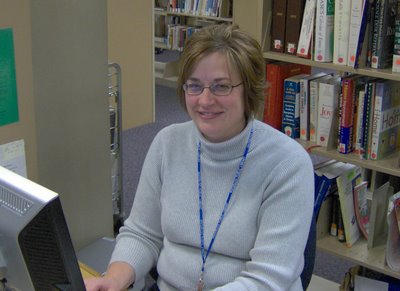 The Waterloo Public Library's newest addition to the blogosphere is "Teens @ Waterloo Public Library." Teen Librarian, Kristi Anhalt, is working to provide innovative library services to teen patrons of the WPL. For more information on teen activities and services, be sure to check out her blog!
The Waterloo Public Library's newest addition to the blogosphere is "Teens @ Waterloo Public Library." Teen Librarian, Kristi Anhalt, is working to provide innovative library services to teen patrons of the WPL. For more information on teen activities and services, be sure to check out her blog!
Monday, November 13, 2006
WiFi at the Waterloo Public Library
 For about a year now, patrons of the Waterloo Public Library have been using their WiFi capable devices to connect to the Internet. The library uses a surplus Dell workstation, a complementary broadband connection from MediaCom, an inexpensive Linksys WiFi AP, and the free management service of PublicIP to provide free WiFi Internet access.
For about a year now, patrons of the Waterloo Public Library have been using their WiFi capable devices to connect to the Internet. The library uses a surplus Dell workstation, a complementary broadband connection from MediaCom, an inexpensive Linksys WiFi AP, and the free management service of PublicIP to provide free WiFi Internet access.Settings for WiFi connections are fairly simple. The operating mode should be "infrastructure," not "ad hoc." The SSID should be "linksys." The network setting for "Internet Protocol" should be "Obtain an IP address automatically." If you're near an access point (e.g., Reference Department or the meeting rooms) your device should acquire a connection within a minute or two.
When you open your web browser you'll be prompted to login. You may either create a username and password or click the "skip" button to proceed. If you use a login instead of the bypass we are in a better position to provide technical support if you have a problem. In either case, access is controlled by the MAC address of your device.
Within five seconds of logging in your browser should automatically go to the library's home page. You'll also see a Public IP connection window that you may minimize (don't close it, or you'll have to start over.)
Once connected you'll have 4 hours of access per day to as much bandwidth as our MediaCom broadband connection can provide. Access is not filtered for content, but the library does limit port access to 80 (Web Surfing) 443 (SSL, e.g. credit cards), 110 (smtp email downloads) 3389 (mstsc e.g., remote desktop) and 5000-5001 (Yahoo Chat).
Access is not encrypted--WiFi users should take care to use their own firewall solutions. Total daily downloads are limited to 300 MB; service starts at 8:00 a.m. and ends at 9:00 p.m., seven days a week. Staff members have been advised to not reconfigure patron WiFi devices (we don't want to break anything). If you have difficulty connecting, please ask a librarian to page a member of the IT staff for assistance.
Sunday, November 12, 2006
Finding Great-Aunt Emaline
From now until the end of November 2006, Ancestry.com is offering free access to its Immigration Collection. If you've been trying to trace the elusive great-aunt Emaline, now may be the time to try.
If you need a few clues to help trace great-aunt Emaline, WPL can provide you with access to HeritageQuest, a database containing scanned and searchable images of the U.S. federal censuses from 1790 to 1930. All you need to access it is your library card number. Starting in 1900, the census asked individuals who had immigrated when they came to the United States.
You can also use HeritageQuest at the library. If you have any questions about this service, please call WPL's reference desk at 291-4476.
If you need a few clues to help trace great-aunt Emaline, WPL can provide you with access to HeritageQuest, a database containing scanned and searchable images of the U.S. federal censuses from 1790 to 1930. All you need to access it is your library card number. Starting in 1900, the census asked individuals who had immigrated when they came to the United States.
You can also use HeritageQuest at the library. If you have any questions about this service, please call WPL's reference desk at 291-4476.
Friday, November 10, 2006
Wikipedia: Authoritative? Or Questionable?
 Wikipedia bills itself as the web's "free encyclopedia that anyone can edit." That statement illustrates Wikipedia's greatest strength as well as its greatest weakness.
Wikipedia bills itself as the web's "free encyclopedia that anyone can edit." That statement illustrates Wikipedia's greatest strength as well as its greatest weakness.Anyone with an Internet connection can instantly create or edit an article on Wikipedia. Wikipedia contributors are not certified nor are their credentials verified--either formally or informally. Critics are concerned that this open--apparently laissez-faire--approach makes Wikipedia content vulnerable to incomptents, zealots, or vandals. While the possibility of bad Wikipedia content troubles the detractors, the proponents contend that the open approach also provides for continual peer review which leads to a superior product.
For example, several weeks ago a prominent news celebrity attempted to demonstate the vulnerability of Wikipedia to vandalism by adding false information to the Wikipedia entry devoted to elephants. The fellow was appalled to see how easy it was to introduce false information. However, within an hour of his changes, an expert on elepants, who had taken upon himself the responsibility of monitoring the article, noticed the vandalism and posted corrections.
The Wikipedia approach to content management follows the paradigm of the the open-source software movement. Uncompiled open-source software code is made freely available to programmers. Anyone is allowed to acquire, edit, and redistribute the software, and thousands do so. The result? Open-source software regularly out-performs that of such giants as Sun Microsystems and Microsoft. Sure, open-source software often has bugs, but those bugs are often discovered and repaired within days while commercial applications often need weeks or months to make repairs.
The same phenomenon is occuring with Wikipedia: experts look after the articles and make regular updates. Users are able to view discussions of the articles and may even view previous versions. This allows the discerning user to evaluate the veracity of the content. Commercial encyclopedias simply do not have the resources necessary to employ similar numbers of experts. In fact, comparative tests of Wikipedia and traditional encyclopedia publishers indicate that Wikipedia's articles are at least as useful, and in many cases superior.
Wikipedia entries can now be found for the Waterloo and Cedar Falls Public Libraries. When you get a chance, take a look at them. If you see errors, go ahead and fix them. I have both articles on my "watch list," and wil be able to see and evaluate the changes.
While you're at it, look at some Wikipedia articles in your area of expertise. If they're broke, fix 'em. If they ain't broke, leave 'em alone.
Wednesday, November 08, 2006
E Audio Books at the WPL
 Patrons of the Waterloo Public Library may take advantage of our subscription to NetLibrary's E-Audio books service. E-Audio books are in the form of mp3 files which may be downloaded using links found in the WPL's online catalog.
Patrons of the Waterloo Public Library may take advantage of our subscription to NetLibrary's E-Audio books service. E-Audio books are in the form of mp3 files which may be downloaded using links found in the WPL's online catalog.Copyrights on the E-Audio books are managed using Microsoft's DRM (Digital Rights Management) protocol. This means that books, which are mp3 files, must be played on a device that has Windows Media Player 9 or or better installed. Media player will not only allow the files to play, but will also allow you to transfer the file from your computer to an mp3 player. The DRM process will also disable the file after 3 weeks, though you may login and make a renewal.
For more information about the Waterloo Public Library's NetLibrary E-Audio books subscription, and how you may activate your account, visit the library or call 319 291 4480 for assistance.
Sunday, November 05, 2006
Marilyn Manson: Uncensored
A Saturday morning incident at the reference desk provides a good illustration of how the WPL provides resources unavailable to the typical K-12 student. A mom and her middle-school daughter were collecting resources for a school research paper. Her topic? Marilyn Manson!
As it turned out, the library's only Marilyn Manson title was checked out and they were in too big of a hurry to wait out a hold on the item. So, I took them to a public access computer and pointed the girl at our Ebscohost full-text search and retrieval products. Our young scholar sighed loudly, and said, "we have Ebsco at school and I've already used it. I want to use Google." Her somewhat exasperated mom wanted to why, if she Internet at school, was it necessary to spoil a Saturday morning with a trip to the public library.
The daughter shrugged, and said, "the school filters Google. The library doesn't." The daughter is correct. The WPL does not now, nor has it ever, filtered Internet access. Allocating scarce resources to degrade the performance of our most important research tool makes no sense.
The daughter used Google to find her Marily Manson articles, printed them out and was soon on her way. Like thousands of other WPL patrons, she was able to search for information without concern that someone would arbitrarily limit her access to sources.
As it turned out, the library's only Marilyn Manson title was checked out and they were in too big of a hurry to wait out a hold on the item. So, I took them to a public access computer and pointed the girl at our Ebscohost full-text search and retrieval products. Our young scholar sighed loudly, and said, "we have Ebsco at school and I've already used it. I want to use Google." Her somewhat exasperated mom wanted to why, if she Internet at school, was it necessary to spoil a Saturday morning with a trip to the public library.
The daughter shrugged, and said, "the school filters Google. The library doesn't." The daughter is correct. The WPL does not now, nor has it ever, filtered Internet access. Allocating scarce resources to degrade the performance of our most important research tool makes no sense.
The daughter used Google to find her Marily Manson articles, printed them out and was soon on her way. Like thousands of other WPL patrons, she was able to search for information without concern that someone would arbitrarily limit her access to sources.
Saturday, November 04, 2006
Voting Update
Thanks to a question from a patron who has recently had back surgery, we have learned that if you will have difficulty getting to your polling place because of mobility issues, the Black Hawk County Election office can help.
Today (Saturday, Nov. 4th, 2007) and Monday (Nov. 6th, 2007) you can call ahead to the Election Office (319-833-3007) and ask them to meet you curbside so that you can cast an absentee ballot. Hours for this service are 8 a.m.-4 p.m. Saturday, and 8 a.m.-4:30 p.m. Monday.
Today (Saturday, Nov. 4th, 2007) and Monday (Nov. 6th, 2007) you can call ahead to the Election Office (319-833-3007) and ask them to meet you curbside so that you can cast an absentee ballot. Hours for this service are 8 a.m.-4 p.m. Saturday, and 8 a.m.-4:30 p.m. Monday.
Friday, November 03, 2006
ILA Planning 2007

More than 80 Iowa Library Association leaders participated in the 2007 planning retreat, held on the Grinnell College campus today. The ILA, a primarily volunteer operated organization, includes 1406 librarians--public and private--from libraries across the state.
The primary purpose of the planning session is to prepare for the next conference. However, the planning retreat also provides an opportunity for the in-coming ILA president--in this case, Grinnell College librarian Sheryl Bissen--to introduce herself to the various committee and sub-division leaders. Sheryl used the occasion to pitch her theme for ILA 2007: Iowa's Libraries: Cultivating the Future.
Bissen's metaphor plays on the agricultural heritage of Iowa, while providing an opportunity to build on the enthusiasm for Web 2.0/Library 2.0 fostered by Michael Stephen's presentations at ILA 2006. The new president called upon librarians to use modern communication technologies to establish contact with Generation Y, also known as the Millennials, born between 1978 and 1998. The Millennials have no conscious memory of a world without the Internet, and have little patience with older forms of communication.
Bissen contends that if librarians fail to "cultivate" the Millennials, we'll lose their patronage permanently. Losing this younger generation will further exacerbate the problem of a rapidly aging population. Therefore, look for ILA 2007 to focus on the use of Web 2.0 to expand the appeal of Iowa's libraries to a more technologically sophisticated generation.
Expect ILA to incorporate Web 2.0 technologies into its communications with members, and anticipate pre-conference workshops and conference sessions which explore ways to reach out to the Millennials. For example, the Information Technology and Young Adult sub-divisions are seeking someone to run a day-long pre-conference workshop devoted to console games (e.g. PlayStations and/or XBox). Recommendations are welcome!
Thursday, November 02, 2006
Vote! Vote! Vote!
As a public library, part of our job is to provide the information that American citizens need to be able to make an informed choice at the polls.
On Nov. 7th you will be able to influence the future of this country by casting your vote.
You can look up your polling location by going to the Black Hawk County website. When you get there, click on the words "Real Estate Mapping." Look up your own address, and then in the left-hand window, scroll down to the bottom. You should see the words "Polling Location." Click on this link to find out what ward and district you live in, which State House and Senate districts you live in, and where you go to vote.
If you haven't yet decided who you want to vote for, the Waterloo Courier's Archives can be of assistance. Just type in the name of the candidate you want to find.
You may also want to visit Project VoteSmart and FactCheck.org for more information on issues and candidates.
On Nov. 7th you will be able to influence the future of this country by casting your vote.
You can look up your polling location by going to the Black Hawk County website. When you get there, click on the words "Real Estate Mapping." Look up your own address, and then in the left-hand window, scroll down to the bottom. You should see the words "Polling Location." Click on this link to find out what ward and district you live in, which State House and Senate districts you live in, and where you go to vote.
If you haven't yet decided who you want to vote for, the Waterloo Courier's Archives can be of assistance. Just type in the name of the candidate you want to find.
You may also want to visit Project VoteSmart and FactCheck.org for more information on issues and candidates.
Wednesday, November 01, 2006
Today's graphic novels
Comics have come a long way since the first titles were introduced in the early 1930s, and some deal with considerably deeper topics than the old-fashioned superheros of days-gone-by (although those are fun too!).
At WPL, you'll find a great selection graphic novels to tempt you. Pick one up, and consider attending the following, sponsored by the UNI Interpreters Theatre:
"Audience Assemble!!! Looking at comic books in new ways
Guest Artists: Timothy Uren and Dr. Harry Brod
November 2, 3, and 4
7:30 PM Curtain
Supported in part by the UNI Gallery of Art
Comic books have been a part of American culture and life since the 1930’s. Often dismissed as juvenile and for children only, comic books are now recognized by many as a legitimate, sophisticated art form, appreciated by adults worldwide. Minneapolis Performance Artist Timothy Uren and UNI Professor of Philosophy Dr. Harry Brod share their unique perspectives on the impact of comic books on their personal lives and on society and culture in general.
Admission is free, and seating is on a first come, first served basis."
At WPL, you'll find a great selection graphic novels to tempt you. Pick one up, and consider attending the following, sponsored by the UNI Interpreters Theatre:
"Audience Assemble!!! Looking at comic books in new ways
Guest Artists: Timothy Uren and Dr. Harry Brod
November 2, 3, and 4
7:30 PM Curtain
Supported in part by the UNI Gallery of Art
Comic books have been a part of American culture and life since the 1930’s. Often dismissed as juvenile and for children only, comic books are now recognized by many as a legitimate, sophisticated art form, appreciated by adults worldwide. Minneapolis Performance Artist Timothy Uren and UNI Professor of Philosophy Dr. Harry Brod share their unique perspectives on the impact of comic books on their personal lives and on society and culture in general.
Admission is free, and seating is on a first come, first served basis."
Tuesday, October 31, 2006
To Game? Or not to Game?
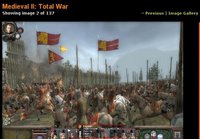 The Waterloo and Cedar Falls public libraries provide patrons with high-speed Internet access on a total of 49 Pentium class computers. There are some days when as many as 80% of the boxes are monopolized by gamers. This leads to complaints from non-gaming patrons as well as loud sighs from staff.
The Waterloo and Cedar Falls public libraries provide patrons with high-speed Internet access on a total of 49 Pentium class computers. There are some days when as many as 80% of the boxes are monopolized by gamers. This leads to complaints from non-gaming patrons as well as loud sighs from staff.Many public libraries go so far as to ban game playing on public computers, presumably so that the machines could be used by patrons doing more worthy tasks--such as online dating, gambling, shopping, or pornography--more typical "adult" activities. Such controversy is not new to the public library world. When the free public library concept was getting its legs, back in the mid-19th century, it was pitched as a way to help the lower classes uplift and separate themselves from misery and ignorance.
The result of this noble intention? The Carnegie foundation's prescribed opening day collections consisted mostly of non-fiction works with very few novels or periodicals. Very soon, librarians realized that the bulk of their circulation was generated by a very small proportion of the collection: fiction and periodicals. So, from the very beginning, public libraries have struggled with how they should allocate resources: recreation or education?
Education theorists are now suggesting that maybe gaming is a way of learning and that multimedia gaming might become the way of the future, thereby melding the allure of gaming with the desire for educational achievement. In fact, some speculate that notion of universal text-based literacy is an aberration. They have a point. Prior Guttenburg's press most people learned by memorizing either poems or songs. Rather than record information as text, they "recorded" it in their memories. Maybe sitting around the hearth, memorizing songs and poetry was a combination of recreation and learning.
One might note that while text based illiteracy is indeed the historical norm, according to Hobbes, "solitary, poor, nasty, brutish, and short" lives were also the norm. If the rise of text-based literacy also led to more pleasant lives, any transition back to multimedia literacy should be watched with caution--if not alarm. Let's hope that the use of computers will allow the reluctant readers to maintain high levels of intellectual function through the more normal multimedia means of sound, pictures, and motion.
Meanwhile, it looks as if games are here to stay, and rather than drive the gamers away, libraries should look for ways to service their recreational and intellectual needs. My favorite site for monitoring gaming activity in public libraries is the wiki, "Gaming," which is the best clearing house for library gaming topics that I've been able to find thus far. If you see something better, or as good, beam it over as a comment. And while you're at it, be thinking about what we can do to serve all of our patrons fairly: gamers and non-gamers alike.
Sunday, October 29, 2006
RSS: Why should we care?
The Iowa library world is still buzzing from a great conference earlier this month in Council Bluffs. Keynote speaker Michael Stephens wowed the crowd with his discussion of how Web 2.0 is leading librarians towards Library 2.0. Stephen's presentation Implementing Blogs and the actual keynote address are in sub-directories of his website.
If you actually go to the site's home page, www.tametheweb.com, you'll see that it's a very sophisticated and dynamic blog--in other words, perhaps the most influential of the Web 2.0 applications: The web log, where Stephens regularly posts commentaries on his RSS enabled site.
With the advent of RSS, followers of websites need no longer check the site each to see if something has changed. Instead, they use their RSS aggregator to collect URLs (links) to pages which have been "pushed" out by website of interest. Had Stephens posted the content of his "Implementing Blogs" and keynote address to the actual blog, instead of to a non-RSS enabled sub-directory, the links would have appear to have been "pushed" out to his subscribers.
In a nutshell, RSS allows readers of multiple websites to check just one page to see dynamic content. Waterloo Public Library staff members will soon see a couple of new in-service training selections: Blogger Buzz and RSS Aggregators. Participants in Blogger Buzz will create their own RSS enabled blogs. During the RSS Aggregator session they'll learn to create RSS subscriptions so that they can read new content.
As time goes on, I expect that most of the Waterloo Public Library's dynamic content will be delivered via blogs; and the blogs will point at conventional webpages with their static content. We're just getting started with Web 2.0; I wonder what Web 3.0 will bring!
If you actually go to the site's home page, www.tametheweb.com, you'll see that it's a very sophisticated and dynamic blog--in other words, perhaps the most influential of the Web 2.0 applications: The web log, where Stephens regularly posts commentaries on his RSS enabled site.
With the advent of RSS, followers of websites need no longer check the site each to see if something has changed. Instead, they use their RSS aggregator to collect URLs (links) to pages which have been "pushed" out by website of interest. Had Stephens posted the content of his "Implementing Blogs" and keynote address to the actual blog, instead of to a non-RSS enabled sub-directory, the links would have appear to have been "pushed" out to his subscribers.
In a nutshell, RSS allows readers of multiple websites to check just one page to see dynamic content. Waterloo Public Library staff members will soon see a couple of new in-service training selections: Blogger Buzz and RSS Aggregators. Participants in Blogger Buzz will create their own RSS enabled blogs. During the RSS Aggregator session they'll learn to create RSS subscriptions so that they can read new content.
As time goes on, I expect that most of the Waterloo Public Library's dynamic content will be delivered via blogs; and the blogs will point at conventional webpages with their static content. We're just getting started with Web 2.0; I wonder what Web 3.0 will bring!
Saturday, October 28, 2006
WPL staff attend 8th Annual Latino/a Conference
The 8th annual Latino/a Conference, held at the Fort Des Moines Hotel in Des Moines, Iowa Friday and Saturday, was attended by WPL Diversity Administrator Claudia Ramirez, Circulation Assistant Carolyn Sallis, and myself, Mike Dargan.
The conference theme, Strengthening and Valuing Latino Families, was reflected in each of the three sessions I sat in on. Jorge Zaballos' presentation, "Cosmic, Race, Rainbow People, and other Myths: An Exploration of Latinos/a as Racial Identity," reminded attendees that the majority of african slaves found themselves in South, not North, America. Dr. Zaballos' thesis focused on the mythology of racial harmony south of the border. He notes that Latin American has a long history of racism that persists to this day. This guy has a lot of good things to say; too bad he had to jam two hours of content into a mere 50 minutes of session.
The keynote speaker, Pulitzer Prize winning journalist Sonia Nazario, shared the harowing story of Enrique's Journery, a central american boy's 2,000 mile search for his long-lost migrant mother. Much of it was hard to hear. I had no idea that as many as 100,000 children a year attempt reunions with the mothers.
And finally, DMACC instructors Mary West and Carrie Mulvihill presented "Why YOU should Learn Spanish," a persuasive discussion of why almost anyone would benefit from second language acquisition--especially if that language is Spanish! If only I could roll those "r's."
The conference theme, Strengthening and Valuing Latino Families, was reflected in each of the three sessions I sat in on. Jorge Zaballos' presentation, "Cosmic, Race, Rainbow People, and other Myths: An Exploration of Latinos/a as Racial Identity," reminded attendees that the majority of african slaves found themselves in South, not North, America. Dr. Zaballos' thesis focused on the mythology of racial harmony south of the border. He notes that Latin American has a long history of racism that persists to this day. This guy has a lot of good things to say; too bad he had to jam two hours of content into a mere 50 minutes of session.
The keynote speaker, Pulitzer Prize winning journalist Sonia Nazario, shared the harowing story of Enrique's Journery, a central american boy's 2,000 mile search for his long-lost migrant mother. Much of it was hard to hear. I had no idea that as many as 100,000 children a year attempt reunions with the mothers.
And finally, DMACC instructors Mary West and Carrie Mulvihill presented "Why YOU should Learn Spanish," a persuasive discussion of why almost anyone would benefit from second language acquisition--especially if that language is Spanish! If only I could roll those "r's."
Thursday, October 26, 2006
Old Tech Too!
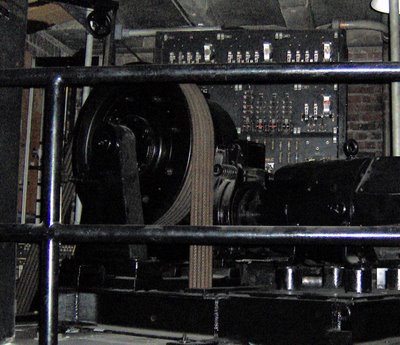
As the WPL alpha geek I'm obligated to admire the newest and coolest electronic gadgets. But I'm also an old farmer who grew up with, and worked for decades on, old-fashioned electro-mechanical equipment. The public elevator house of the Waterloo Public Library, with its massive relays and mechanical switches is fascinating to guys like me.
The elevator's travel is controlled by the switchboard that you see on the wall behind the cable wheel. When someone on the first floor hits the call button, that information is stored on the board and the "logic" of the system decides whether the car stops, or passes, a floor as it delivers its riders.
Modern elevator control systems are the size of a loaf of bread, but do pretty much the same thing with about the same level of reliability. This device was last over-hauled in the 1950s and I wouldn't be surprised to hear that Franklin Delano Roosevelt was President when the major hardware is installed. Will the fancy electronic controls still be working when Chelsea Clinton turns 70? Maybe, but maybe not.
The Waterloo Public Library is a fascinating place--inside and out!
Wednesday, October 25, 2006
All this new tech...
I know we've been discussing the potential role of blogs, RSS feeds, wikis, podcasts and social networks in a library setting. A discussion on this same topic is underway on DIG_REF, one of the listservs that I follow.
R. David Lankes, posted the following to the list:
"We're preparing a technology brief for ALA on social networks and the like. It is currently available for public comment. It may be helpful:http://iis.syr.edu/projects/PNOpen/"
I haven't gotten through the entire thing yet -- it's 56-pages long -- but it's interesting reading so far. I especially like their concept that libraries are in the "conversation business," meaning that we are responsible for facilitating "conversations" between patrons and books, patrons and other patrons, patrons and databases, etc. The idea is that our role is to hook our patrons up to the information that they need, whatever its source.
Check this out!
R. David Lankes, posted the following to the list:
"We're preparing a technology brief for ALA on social networks and the like. It is currently available for public comment. It may be helpful:http://iis.syr.edu/projects/PNOpen/"
I haven't gotten through the entire thing yet -- it's 56-pages long -- but it's interesting reading so far. I especially like their concept that libraries are in the "conversation business," meaning that we are responsible for facilitating "conversations" between patrons and books, patrons and other patrons, patrons and databases, etc. The idea is that our role is to hook our patrons up to the information that they need, whatever its source.
Check this out!
Monday, October 23, 2006
Busy Sunday!
Sunday, October 22, 2006, set a record for sessions on the Reference Department Public Access Computers (PACS). During the 3 hours and 50 minutes (the system shuts down 10 minutes prior to closing), WPL patrons completed 88 sessions with an aggregate total of 4,122 minutes--that's nearly 70 man hours of computer use! Computer users also found time to collect 89 print jobs with a total of 286 pages. There were times when as many as 20 patrons were on the automated waiting list.
We've also had a very busy month. In the last 30 days the system has provided 4,976 sessions consuming nearly a quarter of a million minutes. The printer has been used 3,923 times to generate 14,303 pages. Laid end-to-end those print jobs would reach nearly 2.5 miles.
Since mid-summer the WPL Reference Department has increased its pool of pacs by about 25%. By mid-December we expect to have a 50% increase over the beginning of the fiscal year. We've also increased bandwidth from a shared 3 megabit pipe to a dedicated 10 megabyte ethernet connection.
Keeping up with patron demand is difficult, but we'll the best that we can with what we have. Stay tuned!
We've also had a very busy month. In the last 30 days the system has provided 4,976 sessions consuming nearly a quarter of a million minutes. The printer has been used 3,923 times to generate 14,303 pages. Laid end-to-end those print jobs would reach nearly 2.5 miles.
Since mid-summer the WPL Reference Department has increased its pool of pacs by about 25%. By mid-December we expect to have a 50% increase over the beginning of the fiscal year. We've also increased bandwidth from a shared 3 megabit pipe to a dedicated 10 megabyte ethernet connection.
Keeping up with patron demand is difficult, but we'll the best that we can with what we have. Stay tuned!
Saturday, October 21, 2006
Readers' Advisory at the Waterloo Public Library
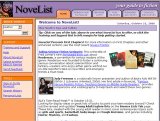
Imagine that you've just finished Janet Evanovich's most recent novel, Motor Mouth, wanted more of the same but didn't want to wait for Janet's next book: What would you do?
That problem is solved if you visit the Waterloo Public Library website, click "Resources," "Ebsco Host," and then choose "Novelist."
From the Motor Mouth page choose "Author Read Alikes," and be treated to a discussion of Evanovich's works as well as comparisons to the works of five other writers of "humourous murder mysteries."
Novelist also provides reviews, as well as links to other books by the author as well as to author websites.
If you're using a workstation at the Waterloo Public Library you'll be able to click and go. If you're off-site, have your library card ready to log into the Novelist services.
Whether you're in the library or browsing from home, give Novelist a try--it's the latest Readers' Advisory tool from the Waterloo Public Library.

Thursday, October 19, 2006
Free Computer Classes at the WPL

Information Literacy specialist Kim Van Deest is now teaching free computer classes in the WPL Learning Center. Today's class covers the details of using a mouse. Later she'll be teaching "Computer Basics" and "Internet Basics."
For more information, visit the Waterloo Public Library webpage and click on "Free Classes."
Wednesday, October 18, 2006
Chess at the WPL
Tuesday, October 17, 2006
WPL Public Access Computers II
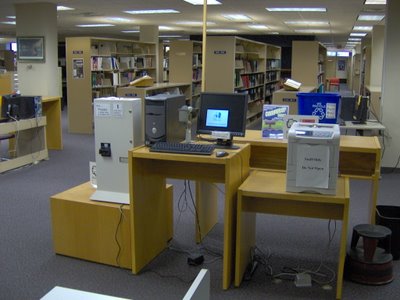
Public Access Computer users who wish to print their work may take advantage of our Kyocera color laser printer. Prints are 5 cents/page for monochrome and 25 cents/page for color.
The computers print monochrome duplex (two-sided) by default, with color available as an option. Printing is easy. Send your print job(s) to the printer of your choice. The jobs will remain in the system for up to two hours. When you're ready to collect your work, go to the print release station, scan your card, select your jobs, depost your money, and click the "print" button. This high quality printer at low price is provided by our generous Friends of the Waterloo Public Library.
Staff members at the service desk will be happy to assist you, should you get stuck.
Monday, October 16, 2006
WPL Public Access Computers I
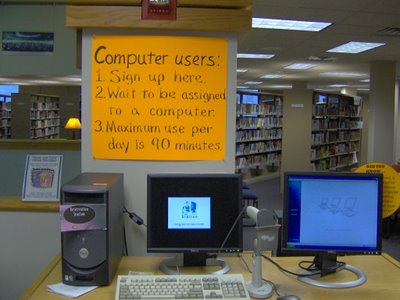
The Waterloo Public Library Reference Department provides 23 public access computers. Patrons may scan their library card at the reservation kiosk near the stairway. The kiosk will first check to see that the card is active. If the card is active, a computer will be assigned and displayed on the screen.
The patron may then proceed to the assigned PC, enter his or her library card number at the login screen, and enjoy 60 minutes of high speed access to the Internet, as well as to a full Microsoft Office Pro suite. At the end of 60 minutes, if the waiting list is empty, the session may be automatically extended 30 minutes or until there is a waiting list.
Patrons without cards may obtain one at any service desk. Cards are free to Iowa residents and temporary privileges may be extended to out-of-towners. If you have any problems connecting, be sure to ask a librarian for help!
Saturday, October 14, 2006
What's Spanish for "Blog"?
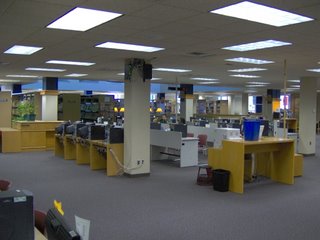 Late this afternoon, Waterloo Public Library (WPL)Diversity Coordinator, Claudia Ramirez, launched the library's first spanish language blog, La Biblioteca WPL. Ms. Ramirez's blog is RSS enabled: point your aggregator at http://bibliotecawaterloo.blogspot.com/atom.xml and you're set for life.
Late this afternoon, Waterloo Public Library (WPL)Diversity Coordinator, Claudia Ramirez, launched the library's first spanish language blog, La Biblioteca WPL. Ms. Ramirez's blog is RSS enabled: point your aggregator at http://bibliotecawaterloo.blogspot.com/atom.xml and you're set for life.Many WPL computer users also enjoy Instant Messaging (IM) but are stymied by the fact that the clients are not installed locally. This morning I ran across a web-based client that solves that problem: MEEBO. Login, create your account, and you have server-based access to four different IM services: AIM, Yahoo, Messenger, and Jabber/GTalk. When my sidekick, Kim V does her next round of upgrades, I'll ask her if we can install the Google Talk IM as well.
Are you weary of waiting in endless queues for Internet access? If so, consider visiting us on Saturday mornings. The picture above was taken around 11:00 a.m. and shows that we were pretty quiet.
--mike
Friday, October 13, 2006
Back Home
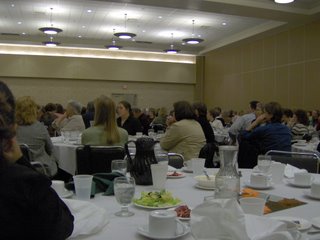
LSA Consultant Ken Davenport, WPL Diversity Administrator Claudia Ramirez, and myself finally made it back from our long road trip to ILA 2006 in Council Bluffs. Of the 11 conferences I've attended since 1996, this one might have been the most interesting.
The first day and second morning were devoted to Library 2.0. Look for the WPL to be implementing several new technologies over the coming months. The second afternoon was devoted discussions of the cultural divide between librarians and academics. Cooperating with local schools and providing support for students has always been an interest of mine. Reference staff have noted that many of our college student patrons have difficulty coping with their online assignments; it's time to reach out schools to discuss how we can provide better assistance.
And, today's sessions dealt primarily with the concept of "Information Literacy." In other words, how well equipped are our patrons to find, evaluate, and use information? How can the library help to improve Information Literacy?
I'm looking forward to hearing comments and brainstorms. I'm also eager to get back to the library to apply some of the things I've learned.
ILA 2006 Wraps up
Good morning!
Today starts off with a general session devoted to a talk on Information Literacy for a Lifetime by Lisa Janicke Hinchliffe. My first concurrent session will then be a panel discussion: Information Literacy: How can Librarians work together to assure Student Success? I'll finish up with Information Literacy: A Conversation. For the first two days I focused on Library 2.0 and the cultural conflicts between teachers and librarians.
You'll be hearing more about each of these topics later in the week.
I'm going to be packing up in a few minutes and won't be back on line until I get home tonight. I'll try to get some pictures posted.
Today starts off with a general session devoted to a talk on Information Literacy for a Lifetime by Lisa Janicke Hinchliffe. My first concurrent session will then be a panel discussion: Information Literacy: How can Librarians work together to assure Student Success? I'll finish up with Information Literacy: A Conversation. For the first two days I focused on Library 2.0 and the cultural conflicts between teachers and librarians.
You'll be hearing more about each of these topics later in the week.
I'm going to be packing up in a few minutes and won't be back on line until I get home tonight. I'll try to get some pictures posted.
Thursday, October 12, 2006
Thursday at ILA 2006
It's about time to hit the sack, but I'd like to let you know what we've been up to today. Michael Stephens' keynote address and presentation on blogs for libraries was as impressive as we expected. It's one thing to read about wikis, flikrs, and blogs, quite another to see them discussed in the context of "Library 2.0."
Stephens' articulation of the unique characteristics of the "Millennial" generation, why they're alienated from public libraries, and how we can reach out them caught the attention of a lot of librarians who, until today, didn't quite get it.
For more details, take a look at Michael Stephen's website.
As I see it now, the WPL Reference department has several tasks to accomplish over the next few months:
Start a regular blog presence that is available from the current website
Start offering IM Reference
Aggressively plan strategy for teen gaming
Create a "sand box" where staff can examine new technologies such as Flikr, Wiki, and You Tube
Stay tuned!
--mike
Stephens' articulation of the unique characteristics of the "Millennial" generation, why they're alienated from public libraries, and how we can reach out them caught the attention of a lot of librarians who, until today, didn't quite get it.
For more details, take a look at Michael Stephen's website.
As I see it now, the WPL Reference department has several tasks to accomplish over the next few months:
Start a regular blog presence that is available from the current website
Start offering IM Reference
Aggressively plan strategy for teen gaming
Create a "sand box" where staff can examine new technologies such as Flikr, Wiki, and You Tube
Stay tuned!
--mike
Subscribe to:
Posts (Atom)





